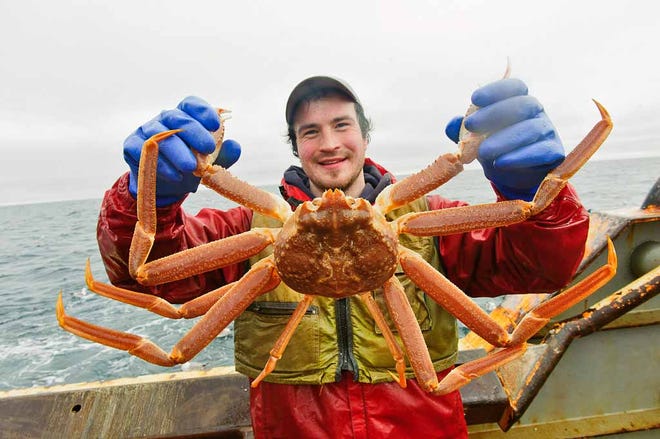
Category: General
Country: United States
Tidal Vision uses discarded crab shells to produce an environmentally safe solution for the textile industry.
Bob Montgomery | Herald-Journal | Published 8.00 a.m. ET July 19, 2021
Seafood lovers may not know it yet, but they are helping to transform the textile industry right in Spartanburg's backyard.
Leigh Fibers of Wellford has partnered with Tidal Vision of Bellingham, Washington, to use a biodegradable biopolymer from crab and shrimp shells called chitosan to produce a new non-toxic, eco-friendly water-based product called Tidal-Tex.
Tidal-Tex chitosan treatments are applied to fibers, yarn, woven or nonwoven textiles used to make products ranging from carpet, furniture, mattresses, clothing and more.
The solution is applied to textiles and prevents the growth of bacterial and fungal microorganisms.
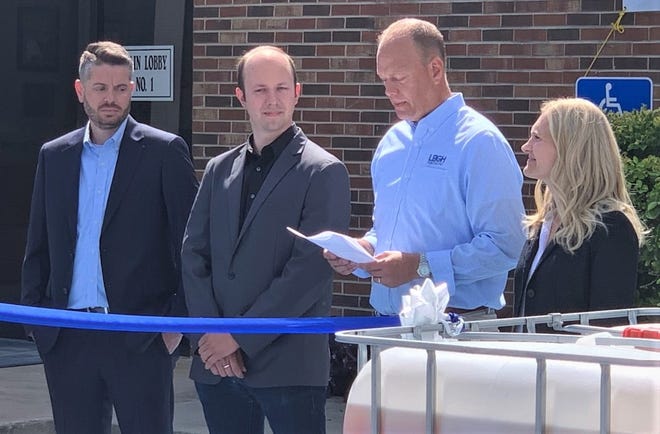
Leigh Fibers of Wellford celebrated its new partnership with Tidal Vision to make an environmentally safe solutions for textile fibers, Thursday. From left are Daniel Mason, Leigh Fibers president; Craig Kasberg, Tidal Vision co-founder and CEO; Eric Westgate, Leigh Fibers senior vice president and general manager; and Kari Ingalls, Tidal Vision director of business development-textiles.
"Leigh Fibers shares in our vision of taking what was previously considered a waste stream and turning it into highly engineered solutions for our customers," Craig Kasberg, Tidal Vision co-founder and CEO said at a joint venture ribbon-cutting ceremony Thursday at Leigh Fibers' headquarters.
"In our business, it's taking crab and shrimp shells – the most problematic byproduct of the seafood industry," Kasberg said.
Tidal Vision will operate in a new 24,000 square-foot facility within Leigh Fibers' 1 million-square-foot headquarters, said Eric Westgate, Leigh Fibers senior vice president and general manager.
Up to 12 new employees will be hired to produce Tidal-Tex, adding to the current workforce of 150 at Leigh Fibers, Westgate said.
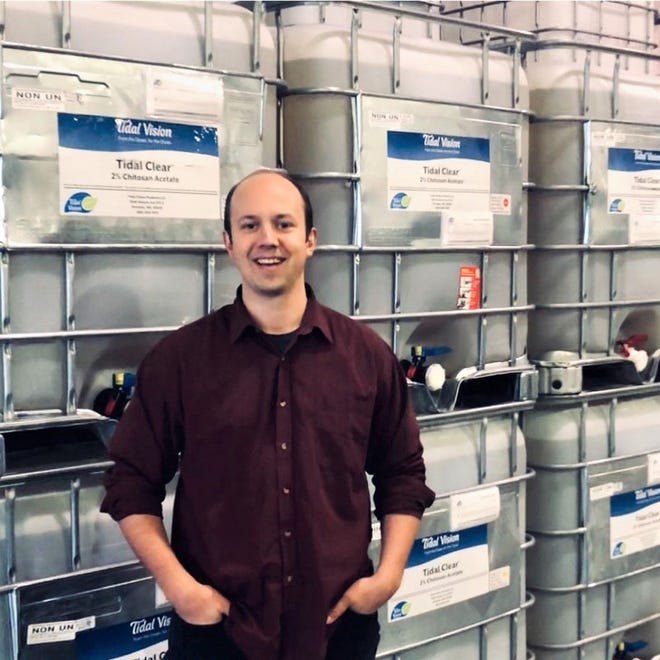
Tidal Vision co-founder and CEO Craig Kasberg.
"Leigh Fibers will be the East Coast arm selling, manufacturing, warehouse and distributing the proprietary chitosan (product)," Westgate said, adding that a deal with Tidal Vision was reached after several months of negotiations.
"In the early stages, trying to say the word chitosan (pronounced KITO-san) was not so easy, to be honest with you."
Leigh Fibers was established in 1922, although its history dates back to 1866 when cotton waste merchant John Leigh Sr. of Manchester, England, produced a cotton spinning operation and ran it under the name of John Leigh LTD.
He and his sons grew their cotton waste and processing business. In 1918, the company established an office in Boston, Massachusetts, hiring Hans Lehner of Germany to run the office.
Textiles in Spartanburg: From 1880 to today: The history of downtown Spartanburg
Lehner eventually bought the company and in 1945 his eldest son Phillip joined and helped grow the company. In 1961, Leigh Fibers relocated two New England plants to a reprocessing plant near Spartanburg, the hub of the U.S. textile industry.
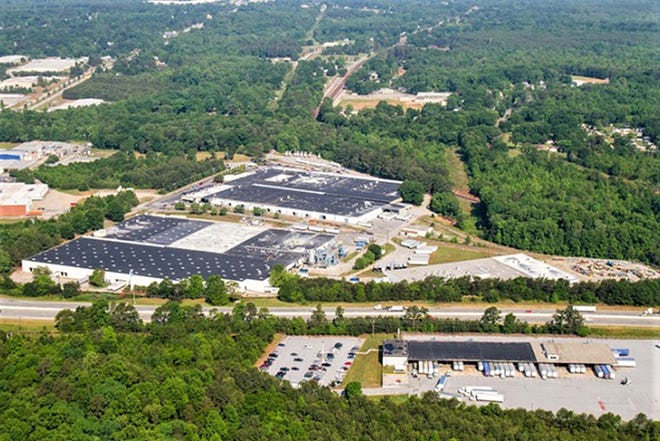
Sky-high view of Leigh Fibers in Wellford.
Expansion: Leigh Fibers plans $10.1M expansion
Today, Leigh Fibers is one of the largest textile waste and byproduct reprocessing businesses in North America, with import and export agreements with companies in 25 countries worldwide.
It purchases up to 300 million pounds of textile waste each year. The materials are sorted and used to create Leigh-Branded fibers, customer-specific fiber blends and specialty fibers, according to its website.
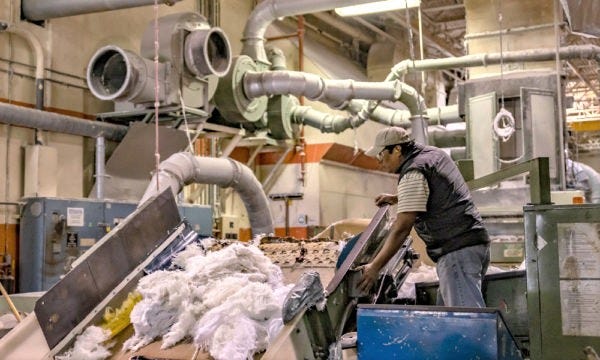
Inside the Leigh Fibers Wellford textile processing facility.
Tidal Vision was founded in 2015 in Bellingham, and has between 15 and 20 employees. It operates 83,000 square feet of production space in facilities across the country.
According to Kasberg, in Alaska alone, 2 billion pounds of fish and crab byproducts are discarded to rot annually. This waste not only represents missed economic opportunity but also poses potential environmental threats when concentrated on the ocean floor.
Tidal Vision purchases discarded byproducts from sustainably managed fisheries, then upcycles the waste into chitosan chemistry solutions that displace synthetic chemicals.
"Our mission is to create positive and systemic environmental impact," Kasberg said. "In the textile industry, to have the biggest impact it made sense to start with fibers treated at the top of the supply chain.
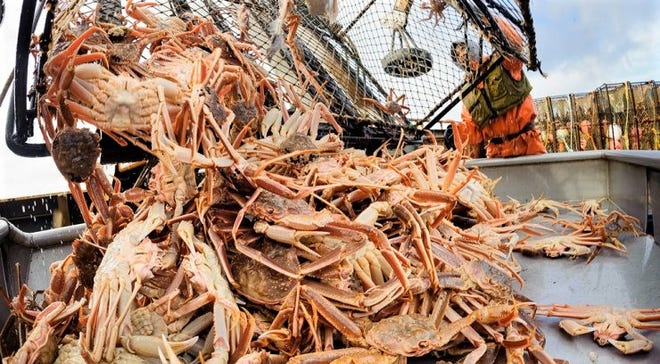
Tidal Vision uses discarded crab shells to produce an environmentally safe solution for the textile industry.
"Leigh Fibers was our ideal partner since their mission, values and business model are so synergetic with ours. Both of our companies produce sustainable solutions by upcycling byproducts that would otherwise end up in landfills," he added.
Contact Bob Montgomery at bob.montgomery@shj.com
Courtesy: https://www.goupstate.com/story/news/local/2021/07/19/leigh-fibers-producing-environmentally-friendly-textile-treatment/7962185002/
Copyrights © 2026 GLOBAL TEXTILE SOURCE. All rights reserved.